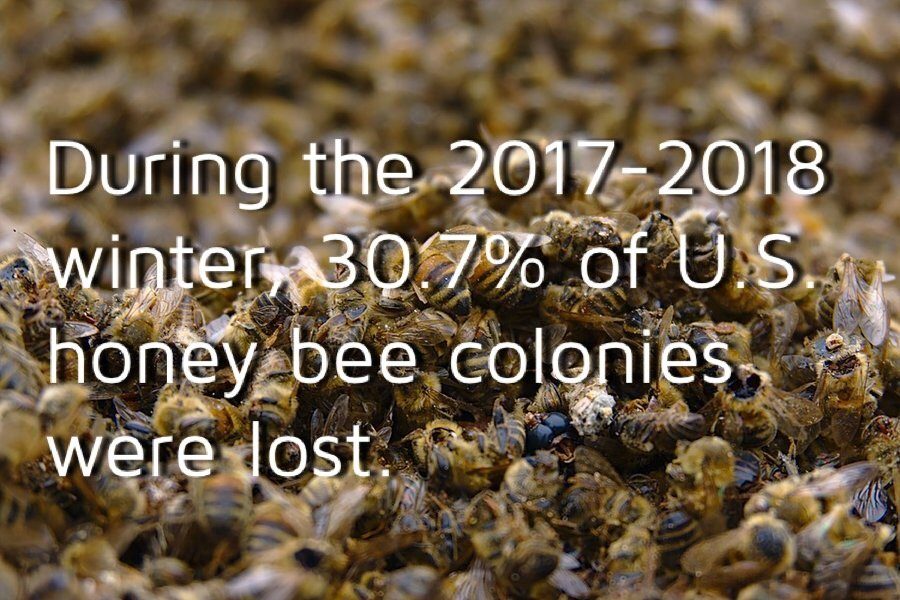Bee more friendly: How being a backyard beekeeper can help save the honey bees
May 15, 2019
When you see a bee floating in the air around your house what do you think? Most of us would swat at it or run away. Excluding wild swarms, there are about one to five trillion honey bees in the world. Although this may seem like a large number, the population is disappearing dramatically. In 2015 alone, 42% of bee colonies in the U.S. died. Over the past decade, one-third of the UK’s bee population has disappeared, and 24 percent of Europe’s bumblebees are threatened with extinction.
Despite the fact that many of us would feel the immediate urge to kill bees, we need to think of other options before their time runs out.
Why are bees dying and how can we help?
Christina Mullan with the Howard County Beekeepers Association believes that the constant use of pesticides and chemicals, along with a lack of nectar and pollen sources, contribute to the decrease in the population. However, we can make a difference.
“It helps to encourage others to not use pesticides or herbicides, as these are deadly to the bees and their food supplies,” said Mullan. Although pesticides and herbicides are more obvious killers, there are unfamiliar problems as well.
“So many people are fanatic about having a ‘perfect’ lawn nowadays. Well, that perfect lawn represents starvation for the bees because important food sources – dandelions, clovers, etc are killed off for the sake of that perfect lawn,” Mullan added.
Opening our lives to accept rather than squash the bees could lead to an increase in the bee population and restore colonies to beekeepers around the world. Bees not only produce honey. They guarantee that the plant population thrives by being the most important pollinators in the world.
“It has been said that if we didn’t have honeybees and other pollinators, we would lose more than one-third of our food supply. Next time you are in the grocery store, try to picture in your mind that over a third of the produce area is no longer there – it’s a bit alarming,” Mullan said.
Beekeeping: the ultimate protection
Bees as pets? Yes! It’s not impossible, and it’s the ultimate protection for the future. Children and teens can learn through a local group, like the Howard County Beekeeping Association–they give structured lessons for “newbees.” Also, 4H has a dedicated category. Many times, new beekeepers learn from experienced mentors.
Howard County resident and gardener Susan Lancelotta is a dedicated beekeeper and has been keeping bees for about six years. Lancelotta has taken on a considerable role to protect the bees by becoming a beekeeper herself.
“Our very first year of beekeeping it must have been beginner’s luck because [the process] was a breeze. We had no issues. The bees did great. We got tons of honey. It was amazing.” said Lancelotta.
Although some may underestimate the task, beekeeping is a rigorous hobby that requires close attention.
“Beekeeping is not a poor man’s hobby, because it’s expensive and it’s very time consuming. You have to feed [the bees] a lot, especially in this area because of the tough winters and short honey making seasons. It takes a lot of time to go in and look at your hives to see if you can troubleshoot if there’s something going on and they need to get medication,” said Lancelotta.
There is an initial start-up cost–just like adopting a cat or dog. Food, housing, medicine and more. Then, there are maintenance costs. Purchasing the bees can cost anywhere from $100 to over $350.
Even though some hives do not make an abundance of honey, Lancelotta finds comfort in the fact that she is actively helping the environment.
Although according to Lancelotta, beekeeping is an incredibly arduous task, and a great sense of pride is found when a colony survives the winter.
Both Lancelotta and Mullan agree that beekeeping is incredibly fascinating and rewarding. Lancelotta described a memorable moment of seeing a wild colony for the first time swarm in her backyard. She described the scene as one “out of a cartoon.”






